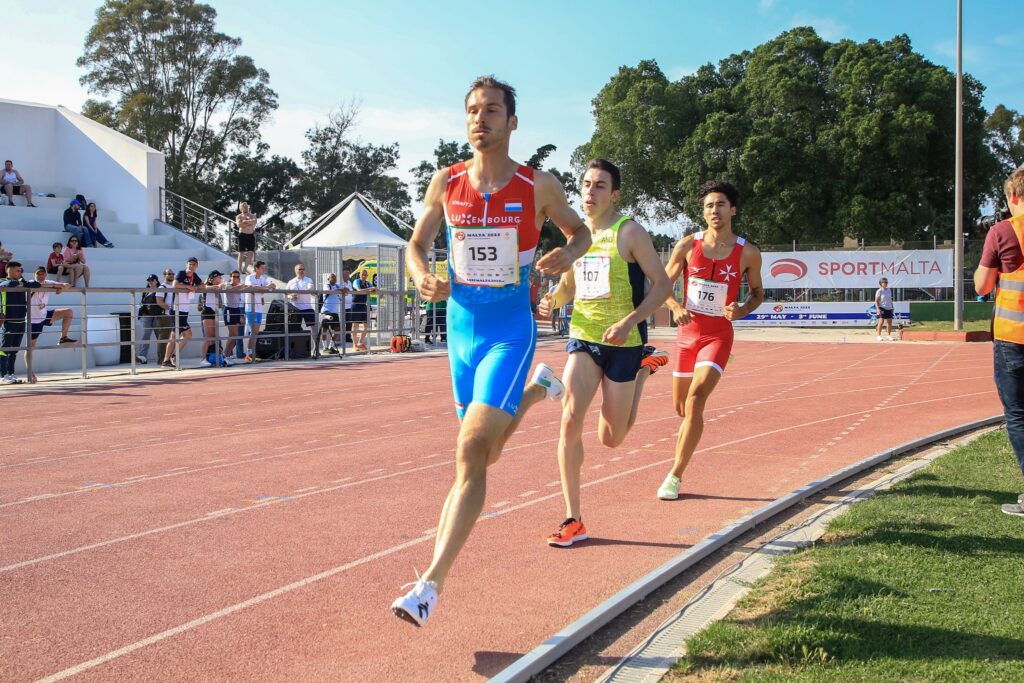Reporters from RTL Télé Lëtzebuerg gather in the media zone just past the finish line at the Matthew Micallef St. John Athletics Stadium. They are joined by other journalists, coaches, and officials from Luxembourg. Olympian Charles Grethen is leading the men’s 1500 meters race as expected. However, Andorran Olympian Pol Moya is close on his tail. As the pair rounds the final, Pol Moya sprints out from behind Grethen to take an unexpected victory at the 2023 Games of the Small States of Europe.
By Matt Nelsen

The scene is one of shock. Moya lifts his arms in victory, before pausing briefly to reflect on what has just taken place. His coach sprints around the track to congratulate him. He shares a brief moment of respect with Grethen, before greeting a jubilant collection of Andorran faithful. Journalists at the track are surprised as well. Ràdio i Televisió d’Andorra races into place to interview their newly crowned athletics champion. Discover the Games’ own correspondent is left to digest the unexpected outcome.
Charles Grethen entered the race as the foremost favorite. He won the title in 2019, before making the Olympic final in 2021. Grethen himself admitted, “I came in as a favorite, and it’s always harder to win a race as a favorite. I had to make the race from the front because I knew Pol Moya and Jared Micallef were strong 800 meter runners. I tried to dictate the race. Of course, that takes a lot out of you, especially after a hard week of training.”
Crowned champion
Moya’s kick completely upended the story Discover the Games had shown up to tell. Grethen was to be crowned champion of the European micro-states once more, and cement his legacy as Luxembourg’s next 1500 meters phenomenon. He explained his race strategy, stating: “I tried to take the race from far out. At 800 meters to go, I tried to make the race a little bit more difficult. I wasn’t able to gap Pol Moya, so I think at the end…he passed me and I had nothing to respond.”
The country rose to prominence in the event at the 1952 Summer Olympics, when in very similar fashion to Pol Moya, Josy Barthel surprised a field of much more fancied runners with a tremendous final sprint. Barthel has remained Luxembourg’s only non-artistic gold medalist at the Olympic Games. Grethen’s performance in Tokyo gave rise to a renewed hope for the tiny nation.
‘Can’t believe it’
Results are never guaranteed in athletics as Pol Moya knows. The Andorran Olympian came second in his favored event, the 800 meters, earlier in the Games. He entered the race as a favorite to medal, but not necessarily to win. Nonetheless, his sprint speed came in handy against Grethen. “I can’t believe it still,” exclaimed Moya minutes after the race. “Beating a guy like Charles Grethen. He is an Olympic finalist.”
While it was special for Moya to beat Grethen at his own distance, the Andorran revealed a desire to move up in distance from his beloved 800 metes. “This last year I’ve been running a lot of 1500 meters, training [at] a more aerobic level,” explained Moya. “I think probably this or next year I will do the jump to the 1500 meters. A win like this reaffirms me or gives me confidence to do this jump to the 1500 meters.”
Mental hurdles
He may have to overcome a few mental hurdles though. He told Discover the Games, “For me, an 800 meter guy, one of the toughest parts of the 1500 meters is when I’m running and I see the two laps to go counter. I say, ‘Oh my God! I still have to run my event.’” Still, the significance of this victory in particular was not lost on him. “For our country, it’s one of the most important races of the year,” declared Moya. “It’s an honor to be able to win and to represent your country. It’s like the second or third most important championship for us.” While his win may have provided an unfortunate reality check for Luxembourg’s Olympic aspirations, it may have also fueled hopes of something special for Andorra.